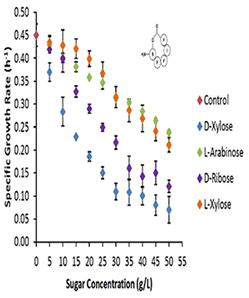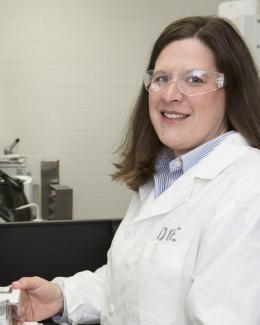
Researcher’s at the Department of Energy’s Oak Ridge National Laboratory in the BioEnergy Science Center (BESC) are working to understand how different sugars derived from plant material affect the metabolism of a cellulolytic, biofuel-producing microorganism.
Clostridium thermocellum is being developed to produce renewable fuels directly from lignocellulosic biomass due to its ability to rapidly utilize polymers found in plant cell walls. While C. thermocellum readily ferments sugars from cellulose, pentose sugars from xylan are not metabolized. The question is – can these sugars, if allowed to accumulate during the conversion of minimally pretreated biomass at high-solid loadings, affect the growth and metabolism of the microbe? James Elkins, Staff Scientist in the Biosciences Division commented, “We want to identify fundamental factors that limit growth and biofuel production under industrially relevant conditions. We found that xylose, which is the second most abundant sugar in plant biomass, has an inhibitory effect on metabolism as concentrations increase in the growth medium. Understanding how the physiology of C. thermocellum changes as non-metabolized sugars accumulate during bioconversion will inform continued efforts to improve the organism.”
Interestingly, extracellular signaling peptides were generated when the cells were exposed to xylose hinting that the accumulation of non-utilized sugars invokes a community-level response. Upon this finding, further work will be aimed at determining whether cell-to-cell communication plays a role in coordinating microbial communities during colonization and fermentation of plant biomass. This work also highlights the importance of simultaneously converting pentose sugars to biofuel during bioconversion which could be achieved with xylose-utilizing co-cultures or engineered strains of C. thermocellum.
This work was supported by the U.S. Department of Energy Bioenergy Research Center by the Office of Biological and Environmental Research in the DOE Office of Science in the BioEnergy Science Center.
Verbeke, T.J., Giannone, R.J., Klingeman, D.M., Engle, N.L., Rydzak, T., Guss, A.M., Tschaplinski, T.J., Brown, S.D., Hettich, R.L., Elkins, J.G., "Pentose sugars inhibit metabolism and increase expression of an AgrD-type cyclic pentapeptide in Clostridium thermocellum", Scientific Reports, 7:43355, 2017. doi:10.1038/srep43355
http://www.nature.com/articles/srep43355
ORNL is managed by UT-Battelle for the Department of Energy's Office of Science, the single largest supporter of basic research in the physical sciences in the United States. DOE’s Office of Science is working to address some of the most pressing challenges of our time. For more information, please visit http://energy.gov/science.






